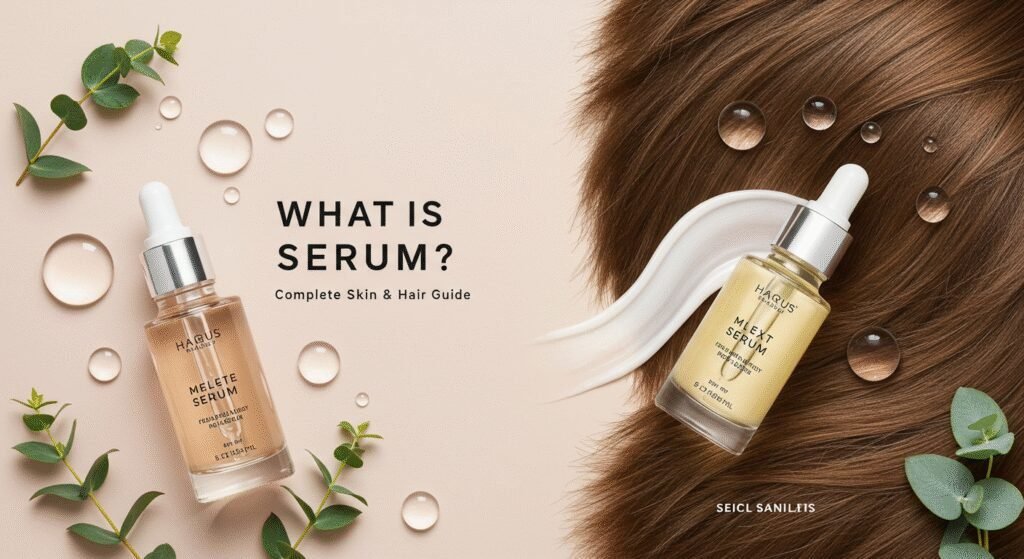No products in the cart.
Blog
What is Serum? Guide for Skin & Hair
When you hear the word serum, most people immediately think of skincare products. But serum is a versatile term used across different fields such as beauty, haircare, and even medical science. This guide will help you understand what a serum really is, how it works, and why it can become an essential part of your skin and hair care routines.
What Exactly is a Serum?
The term serum originates from the Latin word meaning “whey” or “fluid.” At its core, a serum is a liquid formulation packed with concentrated ingredients designed to deliver specific benefits. In medical contexts, serum refers to the clear portion of blood after clotting, containing important proteins and antibodies. In beauty and haircare, serums are lightweight liquids optimized to deliver active compounds deeper than creams or lotions.
You can think of a serum as a targeted treatment—a concentrated shot of ingredients aimed at addressing particular concerns with speed and effectiveness.
Serum in Medical Science: What You Should Know
In medicine, blood serum is the fluid part of blood after clotting, free from blood cells and clotting factors. It contains useful biomarkers such as proteins, hormones, and antibodies that doctors analyze in tests like serum creatinine or serum TSH to diagnose or monitor health conditions. Medical serum and beauty serum share the idea of a powerful liquid carrying essential components, though their uses differ greatly.
Understanding Skin Serums: What Makes Them Unique
A skin serum is a highly concentrated, lightweight liquid designed to penetrate below the skin’s surface quickly. Because they have smaller molecules than creams, serums can deliver active ingredients directly to the deeper layers where they work more effectively.
Here are some popular types of face serums and their benefits:
- Vitamin C Serum: Brightens complexion, fades dark spots, and evens skin tone.
- Hyaluronic Acid Serum: Deeply hydrates and plumps the skin by retaining moisture.
- Niacinamide Serum: Controls excess oil, reduces redness, and helps with acne scars.
- Retinol Serum: Stimulates collagen production to reduce fine lines and wrinkles.
- Salicylic Acid Serum: Exfoliates pores and fights breakouts, ideal for acne-prone skin.
Example: If you have dry skin, a hyaluronic acid serum can boost moisture levels; if you struggle with acne, salicylic acid serums are great at clearing blemishes.
What is Hair Serum? Benefits and Uses
A hair serum is a lightweight, non-greasy liquid designed to treat and protect hair. Different from natural oils, hair serums typically focus on shielding hair from heat damage, pollution, and frizz while enhancing shine and smoothness.
Common benefits of using hair serum include:
- Adds sleekness and shine immediately
- Protects hair from heat styling tools like straighteners or curling irons
- Tames frizz and reduces tangles for easier styling
- Can promote hair growth and strengthen strands when enriched with ingredients like biotin or peptides
Popular hair serum types:
- Anti-frizz serums: Perfect for smoothing hair and controlling flyaways
- Heat-protectant serums: Used before applying heat to minimize damage
- Growth serums: Contain active ingredients such as biotin to nourish the scalp and hair follicles
Example: If your hair looks rough after styling, a silicone-based serum can restore smoothness. For thinning or hair fall, try a biotin-enhanced serum to support regrowth.
How Serum Differs From Other Products
- Serum vs Cream/Lotion: Serums are lighter, more concentrated, and penetrate deeper. Creams mainly hydrate and protect the outer skin.
- Serum vs Oil: Oils sit on the hair or skin surface and provide moisture barriers; serums deliver active ingredients deeper and act more as treatments.
- Serum vs Plasma (medical): Plasma includes blood cells and clotting factors; serum is the clean fluid left after clotting.
How to Use Serum for Best Results
For Skin:
- Start with a clean, dry face
- Apply 2–3 drops of serum evenly over your skin
- Gently tap or pat—avoid rubbing to ensure absorption
- Follow with moisturizer and sunscreen during the day
For Hair:
- Wash and towel-dry hair gently
- Take a small amount of serum and apply mainly mid-length to ends
- Avoid the scalp to prevent greasiness
- Style as usual with your preferred method
Choosing the Right Serum for Your Needs
| Skin Type / Concern | Recommended Serum Type |
|---|---|
| Oily skin | Niacinamide or Salicylic Acid |
| Dry skin | Hyaluronic Acid |
| Signs of aging | Retinol |
| Dull or uneven skin tone | Vitamin C |
| Hair Concern | Recommended Serum Type |
|---|---|
| Frizzy or dry hair | Anti-frizz Hair Serum |
| Heat-styling protection | Heat-protectant Serum |
| Hair thinning or fall | Biotin or Peptide Hair Serum |
Final Thoughts
Serums are more than just a trend—they’re powerful liquids designed with precision to tackle specific skin and hair concerns. Whether you’re aiming to brighten your complexion, deeply hydrate, control acne, or protect and nourish your hair, the right serum can elevate your beauty routine to the next level. Always choose serums based on your unique needs rather than chasing popular fads, and you’ll see lasting improvements.

